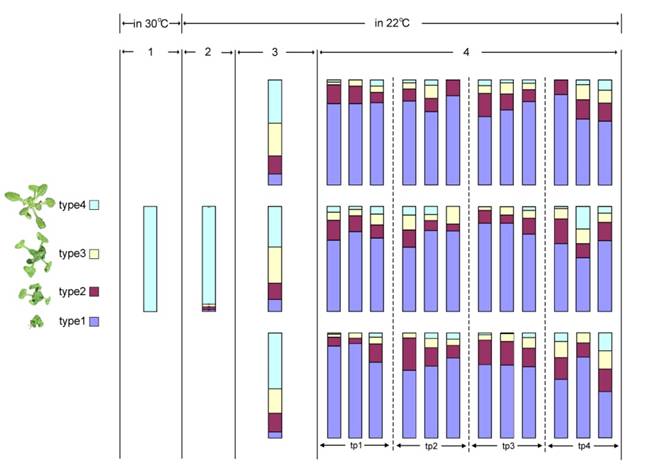Warm Temperatures Induce Transgenerational Epigenetic Release of RNA Silencing by Inhibiting SiRNA Biogenesis in Arabidopsis
Global warming has greatly affected plant growth and development, and poses a serious threat to the global food supply. However, our knowledge on how plants sense and respond to warming ambient temperatures is rather limited. Recently, researchers from Chinese Academy of Sciences reported that an increase in growth temperature from 22°C to 30°C effectively inhibited transgene-induced post-transcriptional gene silencing (PTGS) in Arabidopsis and the warmth-induced PTGS release exhibited transgenerational epigenetic inheritance.
Owing to their sessile nature, plants have evolved sophisticated genetic and epigenetic regulatory systems to respond quickly and reversibly to daily and seasonal temperature changes. It has been estimated that global warming caused a ~10% reduction in rice yield for every 1°C temperature increase. Knowledge of plant responses to extreme heat and cold has been accumulating; however, our understanding of plants responses to moderate temperature increases is limited.
Dr. HE Zuhua and his colleague from the Institute of Plant Physiology and Ecology, Shanghai Institutes for Biological Sciences,with collaboration with Dr. LI Jianming from Michigan University and other groups, generated transgenic Arabidopsis plants expressing a chimeric receptor-like kinase NRG1 for plant immunity activition, consisting of the extracellular and transmembrane domains of the Arabidopsis BR receptor BRI1 and the kinase domain of the rice pattern recognition receptor XA21.Part of the transgenic lines were morphologically similar to an Arabidopsis bri1 mutant, caused by sense transgene-mediated PTGS (S-PTGS) of endougenous BRI1. They found that a mild temperature increase from 22oC to 30oC suppresses the transgene-induced PTGS and other two well-studied PTGS systems, L1 and GXA. Interestingly, such a warmth-induced PTGS inhibition can be observed in subsequent generations grown under normal conditions (as shown in the figure). Deep sequencing of small RNAs and RNA blot analyses indicated that the 22°C-30°C increase resulted in a significant reduction in the abundance of many trans-acting siRNAs that require dsRNA for biogenesis. Further studies showed that the temperature increase reduced the protein abundance of SUPPRESSOR OF GENE SILENCING3 (SGS3), as a consequence, attenuating the formation of stable dsRNAs required for siRNA biogenesis. Importantly, SGS3 overexpression released the warmth-triggered inhibition of siRNA biogenesis and reduced the transgenerational epigenetic memory. These results reveal a previously unknown association between warming temperatures, an epigenetic system, and siRNA biogenesis. The study sheds new light on plant response to temperature changes, epigenetic memory and new technology of transgenic crops.
The study entitled “Warm temperatures induce transgenerational epigenetic release of RNA silencing by inhibiting siRNA biogenesis in Arabidopsis” has been published online in Proceedings of the National Academy of Sciences of the United States of America on May 17.
The research was supported by the National Research Program of China and the National Natural Science Foundation of China by the Chinese Academy of Sciences.
Transgenerational inheritance of warmth-induced release of PTGS
CONTACT:
Zuhua He, Ph.D., Professor
National Laboratory of Plant Molecular Genetics
Institute of Plant Physiology and Ecology, Shanghai Institute for Biological Sciences, Chinese Academy of Sciences
300 Fenglin Road
Shanghai 200032
+86-21-54924121(Tel)
+86-21-54924123(Fax)
email:zhhe@sibs.ac.cn
